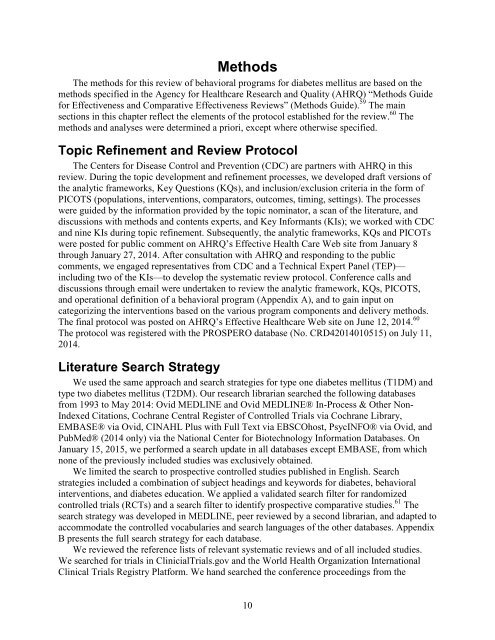Behavioral Programs for Diabetes Mellitus
diabetes-behavior-programs-report-150924
diabetes-behavior-programs-report-150924
- No tags were found...
You also want an ePaper? Increase the reach of your titles
YUMPU automatically turns print PDFs into web optimized ePapers that Google loves.
Methods<br />
The methods <strong>for</strong> this review of behavioral programs <strong>for</strong> diabetes mellitus are based on the<br />
methods specified in the Agency <strong>for</strong> Healthcare Research and Quality (AHRQ) “Methods Guide<br />
<strong>for</strong> Effectiveness and Comparative Effectiveness Reviews” (Methods Guide). 59 The main<br />
sections in this chapter reflect the elements of the protocol established <strong>for</strong> the review. 60 The<br />
methods and analyses were determined a priori, except where otherwise specified.<br />
Topic Refinement and Review Protocol<br />
The Centers <strong>for</strong> Disease Control and Prevention (CDC) are partners with AHRQ in this<br />
review. During the topic development and refinement processes, we developed draft versions of<br />
the analytic frameworks, Key Questions (KQs), and inclusion/exclusion criteria in the <strong>for</strong>m of<br />
PICOTS (populations, interventions, comparators, outcomes, timing, settings). The processes<br />
were guided by the in<strong>for</strong>mation provided by the topic nominator, a scan of the literature, and<br />
discussions with methods and contents experts, and Key In<strong>for</strong>mants (KIs); we worked with CDC<br />
and nine KIs during topic refinement. Subsequently, the analytic frameworks, KQs and PICOTs<br />
were posted <strong>for</strong> public comment on AHRQ’s Effective Health Care Web site from January 8<br />
through January 27, 2014. After consultation with AHRQ and responding to the public<br />
comments, we engaged representatives from CDC and a Technical Expert Panel (TEP)—<br />
including two of the KIs—to develop the systematic review protocol. Conference calls and<br />
discussions through email were undertaken to review the analytic framework, KQs, PICOTS,<br />
and operational definition of a behavioral program (Appendix A), and to gain input on<br />
categorizing the interventions based on the various program components and delivery methods.<br />
The final protocol was posted on AHRQ’s Effective Healthcare Web site on June 12, 2014. 60<br />
The protocol was registered with the PROSPERO database (No. CRD42014010515) on July 11,<br />
2014.<br />
Literature Search Strategy<br />
We used the same approach and search strategies <strong>for</strong> type one diabetes mellitus (T1DM) and<br />
type two diabetes mellitus (T2DM). Our research librarian searched the following databases<br />
from 1993 to May 2014: Ovid MEDLINE and Ovid MEDLINE® In-Process & Other Non-<br />
Indexed Citations, Cochrane Central Register of Controlled Trials via Cochrane Library,<br />
EMBASE® via Ovid, CINAHL Plus with Full Text via EBSCOhost, PsycINFO® via Ovid, and<br />
PubMed® (2014 only) via the National Center <strong>for</strong> Biotechnology In<strong>for</strong>mation Databases. On<br />
January 15, 2015, we per<strong>for</strong>med a search update in all databases except EMBASE, from which<br />
none of the previously included studies was exclusively obtained.<br />
We limited the search to prospective controlled studies published in English. Search<br />
strategies included a combination of subject headings and keywords <strong>for</strong> diabetes, behavioral<br />
interventions, and diabetes education. We applied a validated search filter <strong>for</strong> randomized<br />
controlled trials (RCTs) and a search filter to identify prospective comparative studies. 61 The<br />
search strategy was developed in MEDLINE, peer reviewed by a second librarian, and adapted to<br />
accommodate the controlled vocabularies and search languages of the other databases. Appendix<br />
B presents the full search strategy <strong>for</strong> each database.<br />
We reviewed the reference lists of relevant systematic reviews and of all included studies.<br />
We searched <strong>for</strong> trials in ClinicialTrials.gov and the World Health Organization International<br />
Clinical Trials Registry Plat<strong>for</strong>m. We hand searched the conference proceedings from the<br />
10


